The chances of a future electric passenger ferry service on the Willamette River just got a bit better. That’s because Frog Ferry, the nonprofit that launched in 2018, announced today they’ve secured tentative permission to use two public docks owned by the City of Portland: one at Cathedral Park (near the St. Johns Bridge) in north Portland and one at RiverPlace Marina in south Portland.
In a letter dated July 25th, Deputy City Administrator of Public Works Priya Dhanapal wrote: “The City of Portland is open, in principle, to the potential use of two City-managed docks located at Cathedral Park and RiverPlace for future ferry operations with appropriate dock upgrades by the Frog Ferry to ensure ADA compliance and safety.”
To unlock the permission, Frog Ferry needs to secure additional funding that allows them to complete a host of necessary dock upgrades and go through all required City permit processes.
Even without that money in hand yet, Frog Ferry backers see this is a major step forward. “In the ferry industry, being granted use of the docks is like being handed keys to a building,” said Susan Bladholm, the tireless founder of the organization who has deep ties the transportation and business community.
The City’s decision saves the project millions because they won’t have to engineer and build docks of their own. It’s also a stamp of approval the project desperately needs to regain momentum lost when it floundered under previous PBOT Commissioner Mingus Mapps. With Mapps out of office, Bladholm and her supporters seized the opportunity to pitch their idea to a new slate of councilors under a new local political system.
Now Bladholm says the project is close to reaching its pre-launch funding goal. In their statement Monday, Frog Ferry said they’ve secured $40 million so far for research and planning of the ferry service and need another $20 million for capital construction in order to get the boats on the water.
They hope to raise half of that amount, $10 million, through a Portland Clean Energy Community Benefits Fund (PCEF) grant they’ve already applied for. A decision on that application is expected sometime this month. In addition to the PCEF grant, the group says they have private donors lined up and willing to put money on the table.
The ultimate vision of Frog Ferry is to deploy up to seven, 70-100 passenger vessels with up to nine stops between Oregon City and Vancouver, Washington. The ferries would not carry cars, but would allow bicycle storage. The estimated commute time between Vancouver and Salmon Street Springs would be 44 minutes.
When funding to build the system is secured, Frog Ferry says they’ll begin operation within three years.
For now, the clock is ticking. The letter from the City of Portland that opens the possibility of using these two publicly-owned docks comes with this disclaimer: “Any preliminary support expressed herein is revocable and expires if project funding is not secured within 12 months.”



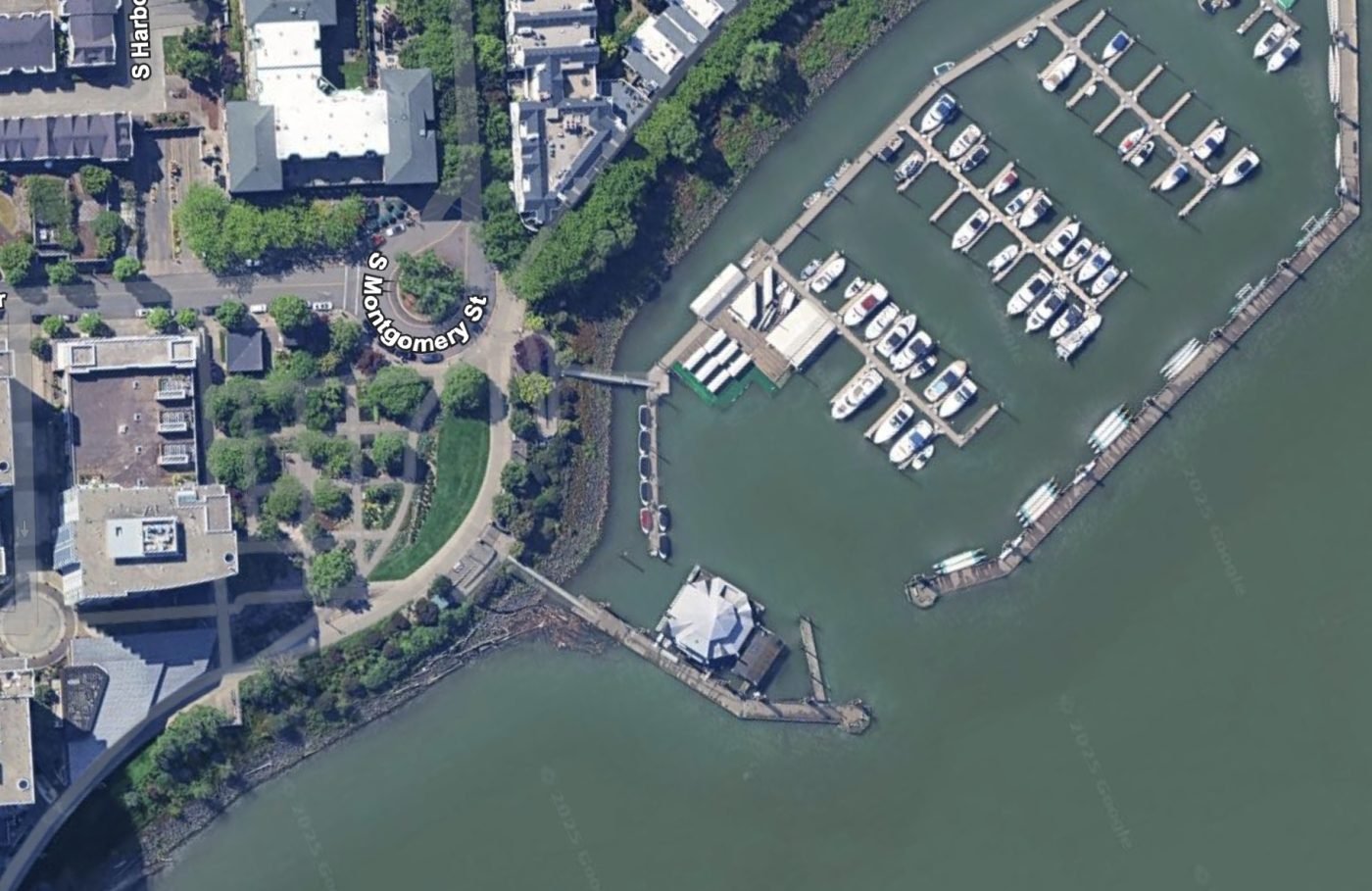
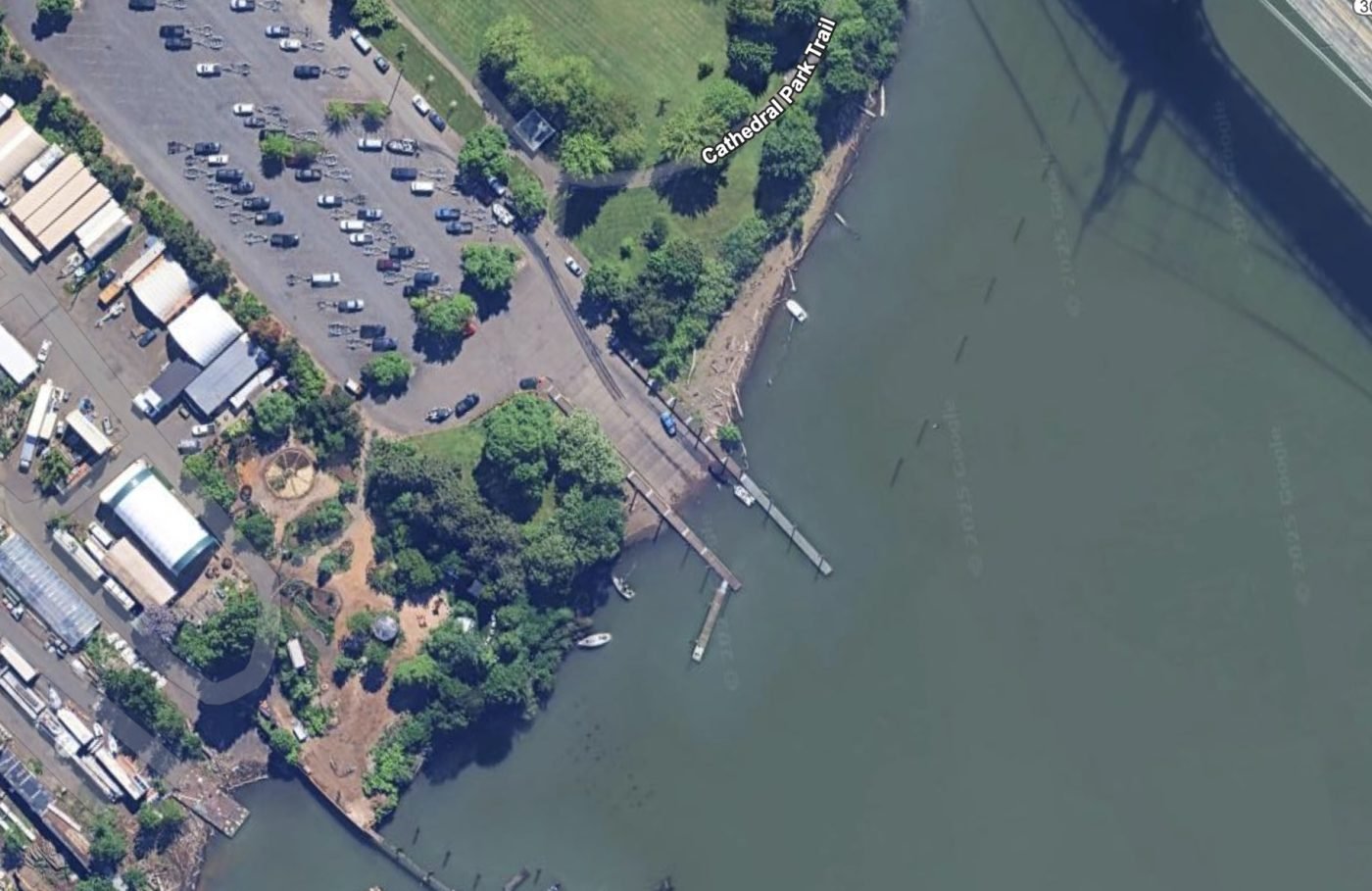

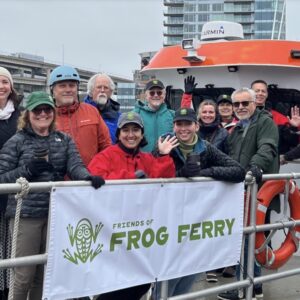
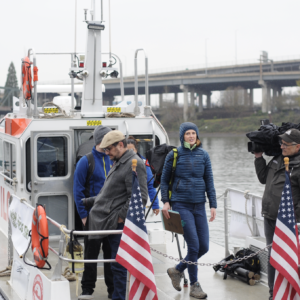
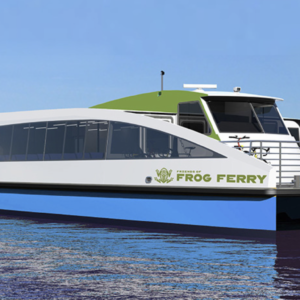
Thanks for reading.
BikePortland has served this community with independent community journalism since 2005. We rely on subscriptions from readers like you to survive. Your financial support is vital in keeping this valuable resource alive and well.
Please subscribe today to strengthen and expand our work.
Bleh, if they get the grant from PCEF it’ll lower my opinion of that program/tax even more than it already is.
Let’s take the Frog Ferry! You get to mix the joys of car commuting to the dock with the absolute pleasure of moving at public transit pace!
This project makes no sense and the thought of spending $10mm on what amounts to at best a tourist attraction while so many things are being defunded makes me a little sick.
How much could $10mm get us when we consider the North Portland Greenway between the Steel Bridge and Cathedral Park?
Portland is completely lost when it comes to any other plan for being a successful city. It’s just this blind, unwavering faith in the idea that people want to be here and will pay a ton of money for the privilege.
Our Voodoo Doughnut / Powell’s Books based economy, lol.
Realistically that hype should have died off a decade ago, yet we cling to it like a security blanket as we sink into the quicksand created by poor planning and a local government that stridently treats businesses like enemies.
The bottom line is that there are much more spectacular places in the US to visit and every other major west coast city is eating our lunch.
Yet there’s still politician / cultist support for “wouldn’t this be cool” nonsense ideas like an electric ferry to nowhere.
Totally a waste of money. Instead we need to spend $7 billion on a new 20-lane bridge, as we’ve already spent hundreds of million dollars on its design, engineering, PR, design, more PR, research, and um…
I actually thought of that bridge project when I read above that the Frog Ferry is spending $60 MILLION before the first boat runs.
Then after people ride it once for novelty and the ridership dies off, they’ll ask for subsidies under the argument that the $60 million will be down the drain if they can’t continue running.
FWIW the city hasn’t really done anything wrong yet. They’d be foolish to not allow Frog Ferry to improve/use dock space if Frog Ferry can find the money to operate. They just said “go for it”.
The real issue would be if PCEF gives Frog Ferry money.
But this is “The City that Works”
No. No. No.
This boondoggle should have ended years ago.
The proposed ferry is not practical for transportation. The river will cause innumerable issues with schedule due to river flows and weather.
Water transportation is inefficient and expensive.
Any hour spent by a Portland staffer on this project is an hour that could be shifted to almost anything to benefit pedestrians, bicyclists, or transit.
Stop it already.
Setting aside whether the Frog Ferry is a good project or not
This is not true. Water transportation is actually one of the most economical ways to move goods and people. So is rail and bicycling for that matter.
I think you’re clearly right generally.
But when streets and bridges already exist for the same route, and the water route isn’t faster or more convenient when you factor in getting to and from the departure/arrival docks (and time matters when it’s aimed at commuters) the equation changes.
I agree water transport is economical for moving freight long distances. Passengers over short distances as planned for the FF will be slower and more expensive than the existing bus options.
This is just a wealthy person’s pet project, and I struggle to see the use case for it, and I’m not a fan of handing out free use of a public resource to a private company…
But, it’s not messing with any of the public swimming docks, the PCEF grant seems unlikely, and it sounds cool to have a cheery little ferry moving about our city. If they’re able to secure private funds … no harm no foul?
Sorry, $40 million for research vs. $20 million for O&M? Follow this money. This is an outright scam to line the pockets of the “researchers.” I can’t believe that this is being allowed to continue. It’s a black eye on the transportation planning + engineering industry that it is.
They could hire me to do the study.
“It won’t get much ridership and it’s a waste of money at a time when our transit system is already in dire straits”
I’ll send them a bill in the mail now
Yeah. But the Frog has a few regionally respected planners and transportation advocates in their corner who are still waving the flag. The data in King County’s Kenmore ferry study, done in the same time window a Frog’s feasibility report, had costs nearly double FF’s, and accounted for the slowing/acceleration, dwell time, and staffing rules (that darned USCG!).
Kool aid has been drunk.
And the grift goes on….
…
Bollocks.
Spend the money on a super barebones commuter rail running from Vancouver to Oregon City instead. The tracks & stations mostly already exist, though there would probably need to be some upgrades with passing tracks and whatnot. St. John’s could get a stop too, but I guess you’d have to build a structure for people to get down to track level. Run a 30-minute peak, 1-hour off-peak from like 5am to midnight and I bet more people would use it than the silly ferry ferry idea.
We definitely need better public transportation from St johns to downtown. I’m not sure if a ferry is the best option for this though. It always irritates me that they didn’t run MAX up Columbia Blvd.
The 16 has pretty meh service and ridership to match on the express route to downtown. Realistically it’s a bus trying to do two things (express trips from St. John’s and industry commutes on Front/Naito) and suffers accordingly but I’m just not sure that St. John’s can support the route on the demand side. I definitely have used it and been the only person riding. Incidentally, the historic express route to St. John’s via Greeley is probably the better choice for this kind of service, since it directly serves UP as well. I see no reason why the 35 shouldn’t take the fast route to St. John’s via Willamette, rather than the slow loop around via Portsmouth.
The elephant in the room? Jobs aren’t downtown anymore.
Frog Ferry is stuck in 2015, gladcasting the forever-upward trajectory of Portland’s rise in the national consciousness and a Place That People Want to Be.
2020 happened.
Vacancy Rate Climbs as Portland Employers Don’t Join Nationwide Back-to-Office Trend
The boosterism of summer (we had some concerts on the waterfront! some people are grabbing a beer after attending the monthly protest march!) isn’t enough to turn the city around.
Meanwhile our existing public transit system has been forced to announce massive cuts to service.
Enough wasted taxpayer dollars. The Frog Ferry scam has gone on long enough.
This is so onbrand for Portland.
A costly boondoggle that will serve 1/10000 of the population.
Ah yes, the PCEF slush fund
$40m for planning and research is absurd.
This should be called the Boonfroggle Ferry and Bladholm should join a circus.
This proposal is still a complete joke. Once you take into account all of the delays related to boarding/deboarding and transfer penalties at each end, a river ferry does nothing an express bus couldn’t do faster, cheaper and better,
A double-decker bus carries 70-100 passengers, comparable to the planned ferry. Currently, C-TRAN 105 makes the trip from Vancouver to downtown Portland in just over 30 minutes. A new double-decker bus costs around $500,000. And the novelty/fun of riding double-decker buses would incentivize at least some riders. (When I was in London, I rode to double-deckers rather than the Tube whenever possible, because it was more fun.) The down side to double-decker buses compared to single-decker is boarding issues, but a double-decker bus can still board/de-board significantly faster than a boat, and express bus service limits the downside of slow boarding. Plus, you can begin and end a bus trip at major transit hubs instead of forcing passengers to use relatively remote docks.
Seven electric double-decker express buses would be a lot cheaper than seven passenger ferries, and would provide faster and more convenient transit.
Double decker buses definitely cost more than $500k, especially if they’re electric. Sound Transit is paying like $2.5M a piece for them (source: https://www.theurbanist.org/2023/08/08/sound-transit-to-buy-new-buses-for-stride-brt-but-some-could-be-lemons/).
Probably still way cheaper than a ferry, definitely cheaper to operate and definitely faster. And there’s definitely plenty of novelty to riding one too! Especially if you get that front upper seat!
When CTRAN initiated double decker service way back when…my cousin and I had a few drinks and got top deck/front row. It was sooooo fun!
I have to agree with all the comments on here, this seems like a total waste of money.
The Frog Ferry is just more grift—wasting taxpayers dollars. No wonder so many high earners are bailing out of Portlander. As Margaret Thatcher said…eventually you run out of other people’s money.
Neither of these docks was built with the intention (and design spec) of small ferry/water taxi use. Cathedral Park’s boat ramp dock was designed for trailerable boats, substantially lighter weight, and overall size, than the potential ferry, and fewer people loading onto the pier at one time. Going to take some $$ to upgrade them. There are also some folks who’ve mentioned the issue of the ferry leaving Cathedral toward downtown, and the potential for wake damage to the new swimming/fishing dock at Cathedral. For the ferry to make it’s time schedule, it will need to get “on plane” which creates large wakes in the process. Other folks “in the know” laugh at the idea that a one-off passenger service boat can be made in 3 years at Frog’s cited pricetag. Boats under USCG rules for commercial service require substantial inspections during all phases of construction, piles of documentation, and “sea trials” before beginning service. Finally, in listening to Ms. Bladholm over the years, it’s unclear if this is going to be a tourist thing or a commuter thing. For a demonstration project, trying to do both is likely not a path to success…do you want MAX or do you want the Willamette Shores Trolley? A water taxi may make sense in Portland, but this is not the team to bring it forward.
After reading one of the earlier Frog Ferry articles here, I did some rough calcs of various legs of the ferry route (back when it also proposed going to Lake Oswego).
I had the same conclusion you have–the ferry couldn’t possible meet its projected leg times without dramatically violating wake regulations–meaning it would be damaging shorelines, docks, and other property, and be hazardous to other river users up and down its whole route. In fact, I remember the numbers were so far off I was guessing that the project may have forgotten to allow time to even dock, or maneuver to dock.
One thing that IS impressive about the Frog Ferry is that every time it’s covered here, it manages to totally unite commenters who almost never agree with one another on any other topic.